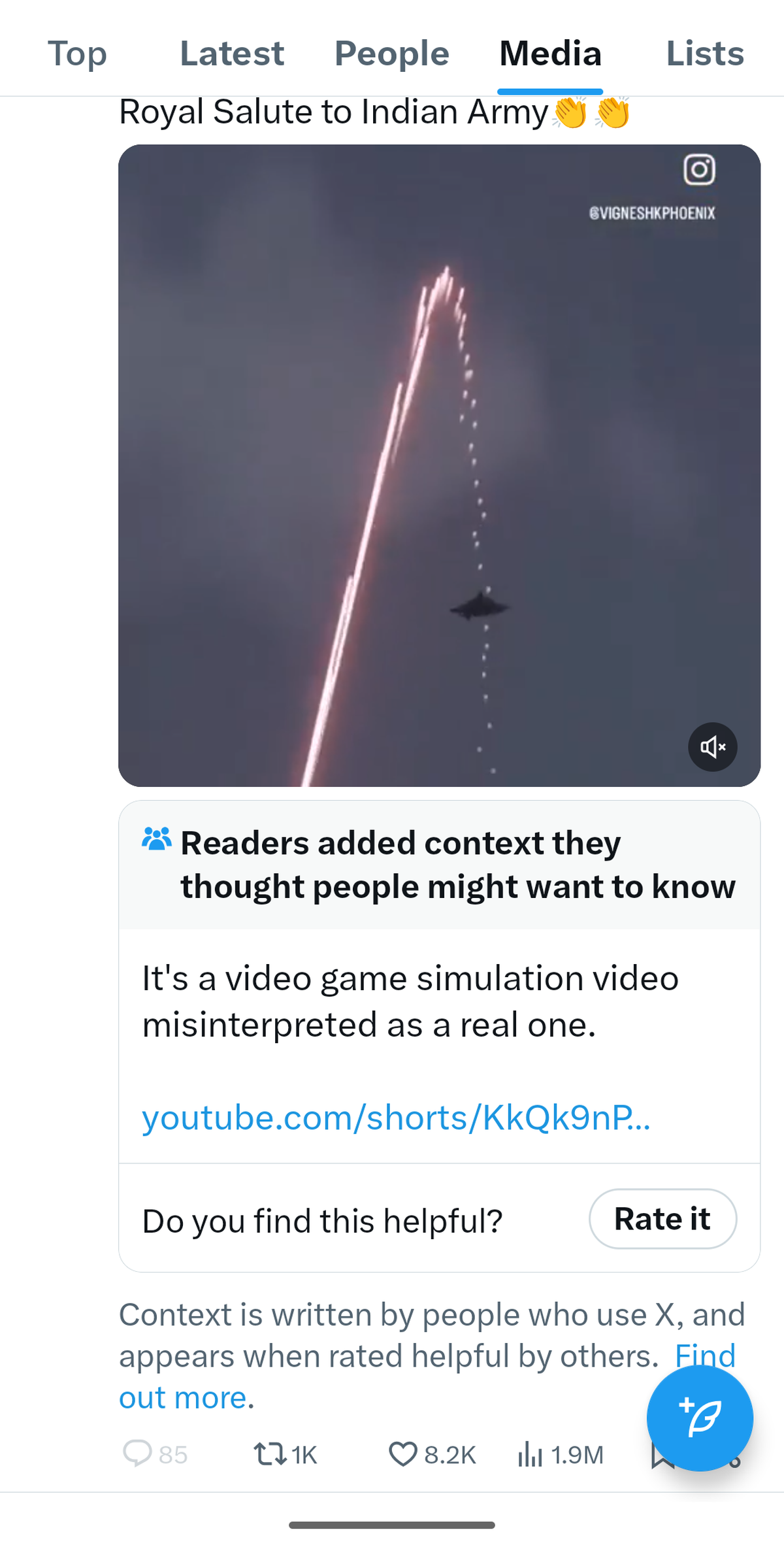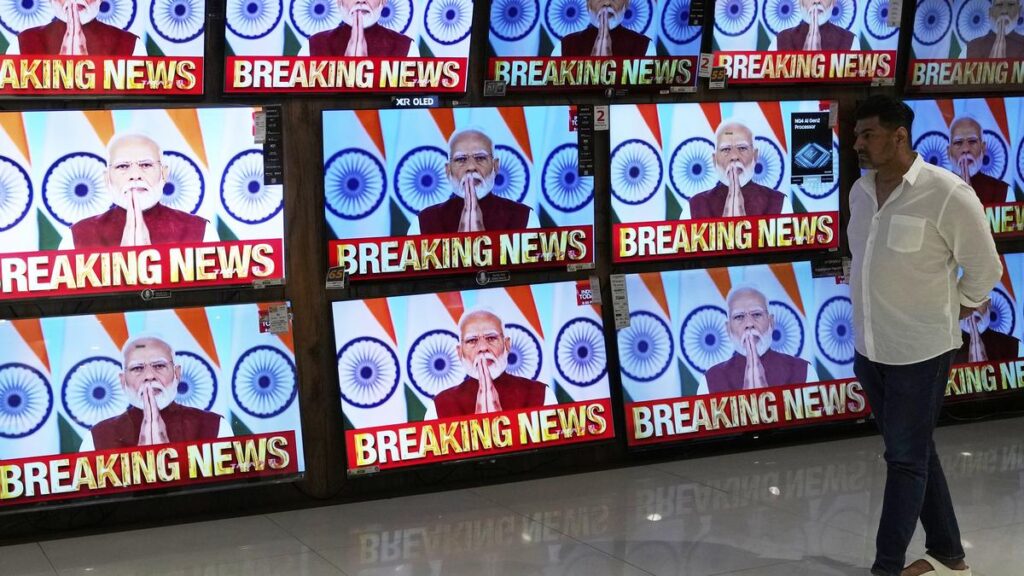Days after the Pahalgam terrorist attack, Himanshi Narwal, wife of murdered Navy Lieutenant Vinay Narwal, denounced hatred and appealed for peace. She further specified that she did not want people “going against” Muslims and Kashmiris.
Shortly thereafter, the grieving newlywed was viciously trolled on X (formerly Twitter). Accounts spreading Islamophobic content slandered her, questioned her loyalty to her deceased husband, called for her pension cancellation, and linked her with anti-army groups.

Trolling and doxxing in wartime
Ms. Narwal was not the only Indian caught in the crosshairs of a social media trolling campaign. After India launched Operation Sindoor against Pakistan on May 7, several Hindutva-promoting handles on X took it upon themselves to target fellow Indians whose opinions differed from theirs in any way. Users who shared posts that promoted pacificism, lamented the loss of lives due to war, expressed regret over shattered India-Pakistan relations, worried for Kashmiri civilians, or disagreed with the name ‘Operation Sindoor’ as they felt it patriarchal, were widely targeted and shamed online.
X users including journalists, activists, artists, and even students were hit with chilling levels of cyber abuse merely for expressing their feelings or asking questions. One far-right account with around 129,000 followers posted the details of people who called for de-escalation or peace. This account provided their Instagram handles, LinkedIn profiles, and other public social media handles so that its followers could harass the owners as well.
On May 11, however, the situation took a shocking turn when social media trolls targeted India’s Foreign Secretary Vikram Misri with abusive comments for simply announcing that India and Pakistan had agreed to the cessation of military operations. Misri’s daughter was caught in the digital crossfire, with her phone number being leaked. This is an act known as doxxing.
Misri went on to lock his X account while other lawmakers or officers came to his defence and praised his service.
Editorial | Toxic trolling: On India-Pakistan conflict, troll army
Indian journalist and fact-checker Mohammed Zubair of Alt News also shared that he was doxxed by right-wing handles and targeted with Islamophobic abuse.
“People have leaked my home address and Mobile Number and have threatened to send Pork to my address. There are already life threats against me. This isn’t the first time. The same person in 2023 had sent Pork to my address and shared the shipping address on Twitter,” he posted on X on May 12.
Doxxers often tailor their attacks to their targets. For instance, doxxed women in India are often harassed over their appearance and face hatred for even normal past activities such as partying and wearing short dresses. Meanwhile, religious minorities and caste marginalised people are hit with abuse targeting their identity and beliefs.
“Doxxing is a direct violation of the fundamental right to privacy affirmed by the Supreme Court in K.S. Puttaswamy v. Union of India (2017),” explained Apar Gupta, Advocate and Founder Director, Internet Freedom Foundation. “Publishing a person’s address, phone number, or other identifying details without consent strips them of security and dignity, and exposes them to threats both online and offline.”
He explained that provisions of the Indian Penal Code and the Bharatiya Nyaya Sanhita include offences for criminal intimidation, stalking, and cyber-harassment, which apply when doxxing leads to threats or targeted abuse.
“When those who speak—or simply exist in the public eye—are met with coordinated personal exposure, others retreat from civic discourse. This degrades the right to privacy guaranteed by the Constitution of India,” Mr. Gupta said.
Misinformation and disinformation
As India and Pakistan both carried out strikes against each other, misinformation about the conflict abounded on social media platforms as several handles shared fake videos that reached many users faster than trusted news outlets and official government releases could.

Adding to this confusion, X said in a statement that it received executive orders from the Indian government requiring it to block over 8,000 accounts in the country, including X accounts belonging to “international news organizations and prominent X users.”
“However, we disagree with the Indian government’s demands. Blocking entire accounts is not only unnecessary, it amounts to censorship of existing and future content, and is contrary to the fundamental right of free speech,” said the X Global Government Affairs account on May 8, adding, “This is not an easy decision, however keeping the platform accessible in India is vital to Indians’ ability to access information.”
Social media giants have long been under pressure to curb misinformation and disinformation on their platforms. Despite human fact-checkers and automation, no system has yet satisfied critics on either side of the political spectrum. To add to the challenge, these platforms have steadily diluted their content policies in favour of monetisation.
During Operation Sindoor, falsified video content including Israeli airstrikes against Palestinians, generic clips of exploding firecrackers, and video game visuals were misrepresented as Indian strikes against Pakistan, and vice versa. Such content was reposted hundreds, if not thousands, of times. During the tense conflict between India and Pakistan, fake videos of violence were spread even by some Indian TV news anchors.

On the other hand, one X user knowingly posted false wartime visuals from a video game and claimed to support the Indian army.
“I know it’s video game, so what? I am not there to shoot real fight, it’s my belief that india might have such a defence mechanism, so, this video clip add value to my imagination and I feel it’s meaningful to honour our army with such a clip, instead of real bloods shed video post, is that any wrong in it?” the user commented on May 8 after being called out.

X fact-checks a fake Operation Sindoor post that has already recorded over 1 million views
| Photo Credit:
Sourced from X
Their fake video had garnered approximately 1.9 million views, as reported on X.
In contrast, some journalists whose X handles had been blocked on government orders frantically attempted to regain access to their accounts in order to communicate with their followers.
Safety tips for posting online during civil unrest and war
Posting Tips
Remember that your physical and mental safety are your first priority. Consider the risks and benefits of weighing in on sensitive social media topics before you hit ‘post.’ A controversial social media post could cost you your job and housing, or put you and those depending on you in physical danger. Ask yourself if you are prepared to face these consequences
In case you wish to post about a sensitive or controversial issue, consider restricting or disabling comments so that trolls and malicious users cannot directly interact with you
If a post or statement you have published online begins to gain traction, you might find it helpful to mute notifications from people you are not following
Anti-Doxxing/Trolling Tips
Doxxing can happen in numerous ways. Your address, phone number, family members’ addresses, private social media channels, and personal pictures could be accessed and leaked online for others to misuse. Be aware of media you may have on other channels such as YouTube, Instagram, LinkedIn, etc. and decide whether to lock down all these accounts for safety
Be ready for doxxers and trolling agents to try hacking your various digital accounts. Make sure to set up multi-factor authentication for all your social media channels, and keep an eye out for any strange links, financial records, or payment requests, as these may be phishing attempts. Be vigilant about devices and accounts belonging to your family members as well
Attackers who have obtained your address may try harassing you by sending a large number of police cars, ambulances, unpleasant deliveries, etc. to your home to scare you. For this reason, is it crucial that you report doxxing incidents to the police without any delay so they can take preventive action
Report without delay any cyber crimes to the social media platform’s safety team, the grievance officer for that social media company, and the police
Keep a well-organised log of any cybercrime incidents. Note down information such as account URLs, names, screenshots, time-stamps, etc. in order to share this evidence with the police. In case you are not in a position to leave your home, you can also file a complaint through the national cyber crime reporting portal
Published – May 13, 2025 09:31 am IST

